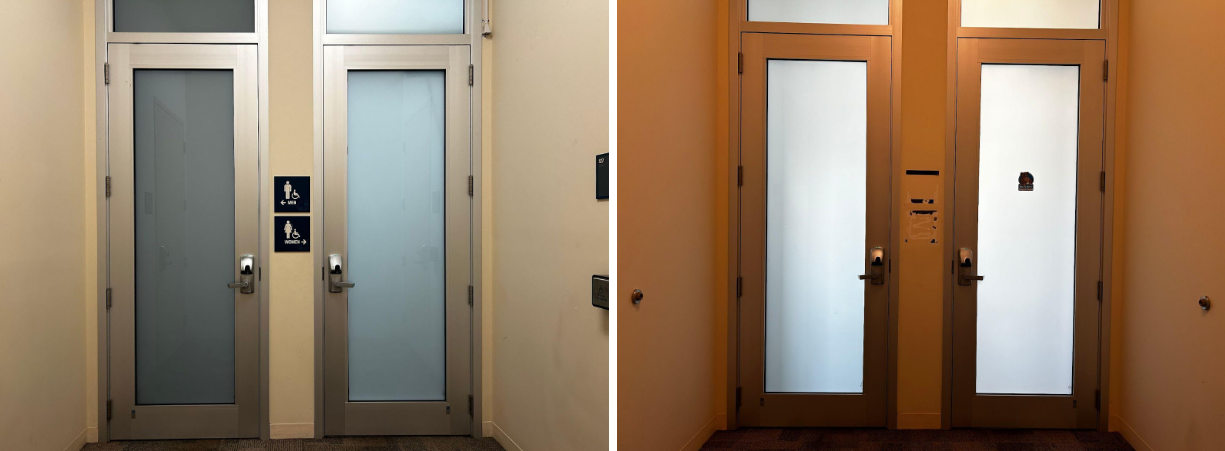Section 553.865 of HB 1521 went into effect on July 1, 2023. On the afternoon of March 29, the New College community was notified via email by Chief Audit Executive and Chief Compliance Officer Alexander Tzoumas that New College will be implementing the bill, which includes reporting those who use bathrooms not in accordance with their assigned gender at birth. The message from Tzoumas sparked campus-wide conversations among students, staff and faculty about the implications of the new rule.
Section 553.865, better known as the “Safety in Private Spaces Act,” clearly defines “male” and “female.” The bill specifies where these rules shall be implemented, including but not limited to: state prisons and detention centers, any state, county or city-owned property and educational institutions from Kindergarten through university.
This section of HB 1521 further details the repercussions for those within educational institutions who violate the bill. According to the Florida Senate language, the bill “requires each educational institution to establish in its code of student conduct disciplinary procedures for any student who willfully enters a restroom or changing facility designated for the opposite sex on the premises of the educational institution, for a purpose other than the authorized uses listed in the bill, and refuses to depart when asked to do so by an authorized person.”
The authorized uses in question are reserved for parents and their children under the age of 12, those assisting elderly or disabled folks, law enforcement, governmental regulatory personnel, emergency medical service providers, maintenance workers and custodial staff.

The addition to the Code was written by Tzoumas and Director of Community Education and Standards Dorothea Mack with assistance from legal counsel. The Catalyst contacted Tzoumas or further information and to better understand the changes in the Student Code of Conduct. He said that the decision to announce this change so long after the implementation of the bill can be explained by the State University System Board of Governors Regulation 14.010, which required universities to be in compliance with the bill by April 1.
“The Facilities Department, Campus Police, Legal Counsel, myself and other departments worked for months on bathroom labeling, single use unisex bathrooms, changes to policy, an update to the Student Code of Conduct,” Tzoumas told the Catalyst via email. “[March 29] was the last day we had for the President to sign and send in the Certification of Compliance with the bill. I waited as long as I could to make sure all the compliance efforts were in place before asking the campus community for their support.
“One of the cornerstones of compliance is to make sure everyone understands what the regulations require so they are not caught in a situation where they are doing something unknowingly that violates the law,” he continued. “So an important part of my role is to make sure everyone is informed when a new regulation is implemented.”
While the timing of such an announcement just before the weekend was questioned by the community via forum threads and conversations in the following days, the most pressing concern was the beginning of what Faculty Co-Chairs Amy Reid, Alberto Portugal and Pat McDonald called “bathroom vigilantes” and a “hunt” in a letter sent directly to Tzoumas and the New College community on April 1.
Their letter came in response to the following excerpt from Tzoumas’ initial email, which stated, “In order to comply with the requirements of the Bill, faculty and staff shall promptly report any instances of noncompliance with these requirements to the Office of the General Counsel and to the Chief Compliance Officer. The Campus Police will charge non affiliates who refuse to leave the restroom with trespassing.”
The letter asked the Chief Compliance Officer further clarifying questions, including: “How do you suggest we determine whether someone is in the ‘wrong’ bathroom? Are we supposed to make biased assessments based on clothing or hair style?… Are we rather supposed to judge based on our perceptions of appropriate body shape or size?… In what way are we to presume to know another person’s biological sex?” And further, “New College IDs don’t indicate anything besides our names and status as faculty, employee or staff. Surely you’re not suggesting we invade the privacy of another to demand information that really has nothing to do with the educational purposes that bring us together? Please explain.”

The letter sparked conversation on the forum, with students and alumni expressing their appreciation for the faculty chairs and for various resources regarding Floridians’ rights in light of HB 1521, such as a “know your rights” page created by the ACLU and the Human Rights Campaign’s page for mental health support. “What I think is important to recognize is that, after reading it, I see no place in the bill where it says that faculty, administrators, law enforcement or staff are required to ask someone to leave the restroom if they know or suspect that the restroom does not align with the person’s assigned sex at birth,” third-year Sara Engels told the Catalyst via email. “Also, students are subject to disciplinary action only if/when they have been asked to leave the restroom by a member of the faculty, administration, law enforcement or staff, and they refuse to leave. Provided the person leaves when requested by an authority figure, then there are no repercussions.”
It is important for students to know who has the authority to make such a request and to be well aware of their rights. Please visit the ACLU and Human Rights Campaign pages to help assuage any anxieties surrounding the new legislation.

